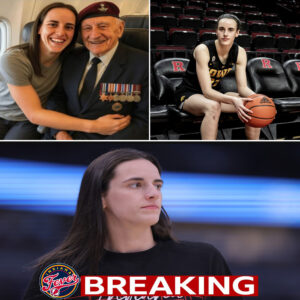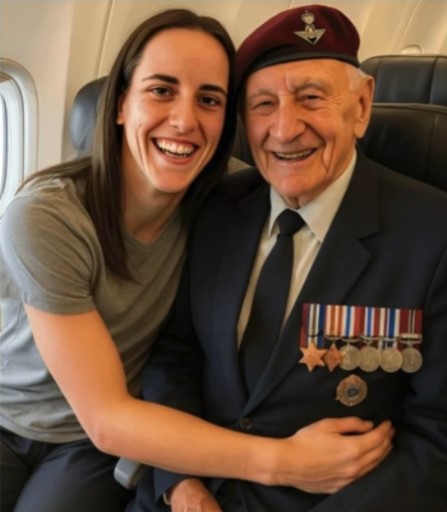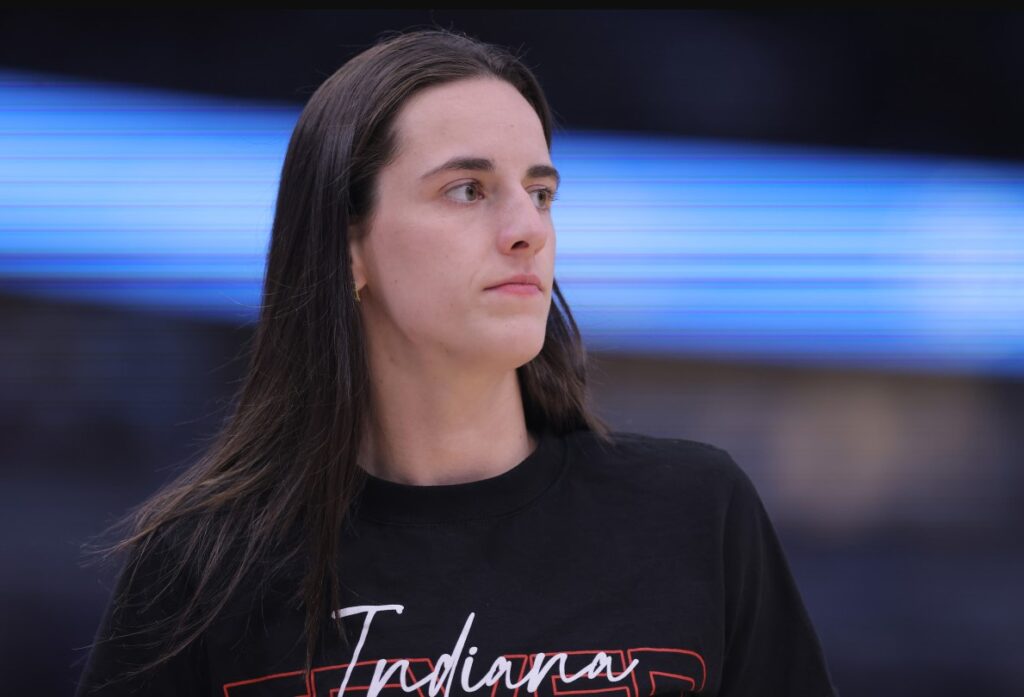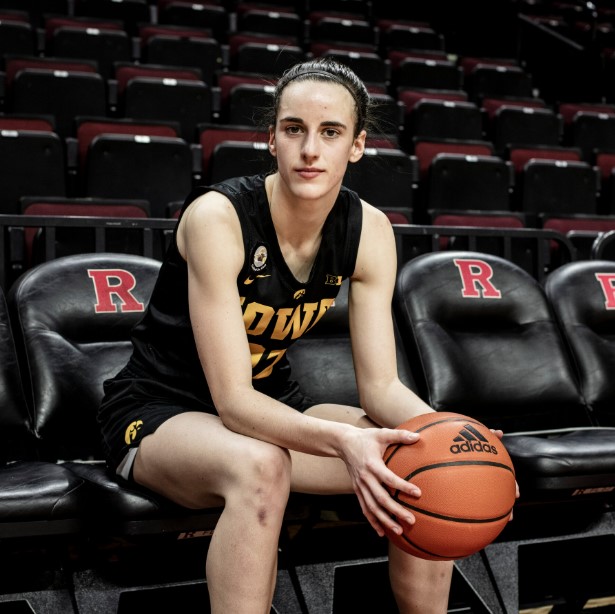It Was Just Another Flight — Until Caitlin Clark Changed Everything Without Saying a Word
It was just another ordinary flight, the kind of brief connection athletes make a hundred times between media duties and team practices, a blur of airports and hotels that rarely leave behind any memories worth retelling.
The gate area buzzed with the familiar, low-frequency hum of routine—passengers checking watches, kids tugging at parents, a man in a wrinkled suit muttering complaints about boarding groups and tight connections, while overhead bins quickly reached capacity and earbuds went in to mute the world.
No one onboard that flight expected a story to unfold, certainly not the kind that would go viral or end up stirring the hearts of thousands across America, and especially not her, not Caitlin Clark, the 22-year-old WNBA sensation still trying to adjust to life under the constant spotlight of fame.

Wearing gray Nike sweatpants and a hooded Iowa sweatshirt half-draped over her head, Caitlin walked on early with the first boarding group, earbuds securely in place, doing her best to move quietly, unnoticed, like just another traveler who wanted nothing more than to reach her destination without fanfare or fuss.
But when your name headlines national broadcasts and your jump shot redefines the future of women’s basketball, anonymity becomes a luxury you rarely get to enjoy—even if, on that day, something far more important than attention found her first.
Her seat, as arranged by team travel staff, was near the front of the plane, second row on the left, nestled into first class with just enough legroom to stretch, sip sparkling water, and get a few moments of rest before the grind resumed in Chicago.
She wasn’t looking for anything remarkable, just the usual comforts afforded to a young star who had, through talent and relentless drive, earned every ounce of her spotlight—and yet, one glance down the narrow aisle shifted everything before she even sat down.
Seated alone back in coach, row 24 to be exact, was a man in his seventies—gray hair peeking from beneath a worn navy cap, the kind stitched with simple gold letters that often go unnoticed until they don’t: “U.S. Navy Veteran.”

He held a newspaper folded neatly in half, a relic from a generation that still values the feel of real pages between fingers, and though his eyes seemed to study the crossword puzzle, they carried a weight of history that couldn’t be folded or solved away.
Perhaps it was the way he sat so upright despite the tight space, or how his eyes briefly met hers with a nod that wasn’t pleading, only dignified, as though he had never expected any favors and would never ask for one.
Caitlin paused—not dramatically, not in some orchestrated moment of theater—but just long enough for something wordless and weighty to pass through her, something inherited from grandparents or old coaches or locker room talks about sacrifice and humility.
And then, with no camera rolling and no entourage watching, she turned to the flight attendant near the front and said something simple: “Can I switch seats with him?”
The attendant, confused at first, glanced at the manifest, then at Caitlin, then at the man in row 24, and finally understood that this wasn’t a stunt or a publicity gesture—it was a quiet act of recognition between a young athlete and someone who had once served something far greater than a basketball team.
Caitlin walked toward the back of the plane, carrying her backpack now slung casually over one shoulder, and without drawing attention to herself, gestured for the veteran to come forward.

At first, he looked puzzled, even hesitant, unsure whether this was some kind of mix-up or misunderstanding—but the sincerity in her eyes said it all, and when he stood, the hush that fell over nearby passengers was as real as any timeout in a packed arena.
He clutched his cap with both hands as he walked forward, the insignia facing outward like a badge of stories too heavy for words, and when he reached Caitlin’s empty first-class seat, he paused only to whisper, “Thank you, young lady,” with a voice that sounded like it had weathered both war and wonder.
What happened next didn’t involve any grand applause or standing ovation, but instead, a ripple of quiet respect that passed from row to row, aisle to aisle, until it seemed the entire plane had grown still in the presence of something rare and beautiful.
A child stopped fidgeting with her seatbelt and looked up wide-eyed; a businessman closed his laptop; someone near the exit row gently wiped their glasses, pretending not to be moved.
And somewhere above the clouds, 30,000 feet over middle America, Caitlin Clark—the record-breaking rookie who shatters three-pointers and ticket sales—had just reminded everyone onboard that character travels even farther than talent.
There were no reporters present, no media blasts, no Instagram selfies to capture the moment, and yet it found its way to social media through a fellow passenger’s brief post: “Just watched Caitlin Clark give up her first-class seat to a Navy vet without saying a word. We need more like her.”
The post gathered thousands of likes within hours, but more importantly, it stirred conversations not just about fame or sportsmanship, but about kindness done quietly, without needing credit or an audience to validate its worth.

When asked later by a teammate about what happened on the flight, Caitlin simply shrugged and said, “He earned it. I’ve got legs that can handle row 24. No big deal.”
But of course, it was a big deal—not just because of who she is, but because of what it said about who we can all choose to be when no one’s watching, and the only stage is the space between two strangers.
In a world that celebrates highlights and headline-making moments, it was a subtle, fleeting gesture that reminded us the most powerful plays don’t always happen on the court—they happen in the aisles, in the pauses, in the choices that reveal the soul of a person.
And while Caitlin Clark may go on to shatter WNBA records, redefine endorsement deals, and lead her team to championships, it’s what she gave up—rather than what she achieved—that may echo the longest in the hearts of those lucky enough to witness it.
Because on that flight, she didn’t just trade a seat.
She elevated a nation.